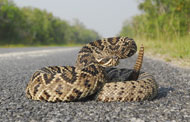A study suggests rattlesnake roundups are negatively impacting populations of eastern diamondback rattlesnakes.
A study on rattlesnake roundups in the southeastern U.S. suggests the events are contributing to declines in eastern diamondback rattlesnake (Crotalus adamanteus) populations.

A study suggests eastern diamondback rattlesnake populations are declining due in part to rattlesnake roundups.
Published in the journal Herpetological Conservation and Biology, the study analyzing data from four roundups spanning 50 years found that both the numbers of rattlesnakes caught and the weights of the largest snakes declined over the past 20 years.
D. Bruce Means, president of Coastal Plains Institute and Land Conservancy, a nonprofit conservation organization in Florida, authored the study. He gathered information from roundup promotional literature and local newspapers, and he constructed scatter plots to help show trends in the data.
According to the study, those trends were generally similar for all four roundups. Numbers of eastern diamondback rattlesnakes entered in the four contests peaked near 1990 and declined thereafter. Data from all four roundups on the weights of eastern diamondbacks that won the largest-snake prize also showed a steady decline since the mid-1980s.
Drawing from these results, Means concluded that rattlesnake roundups are negatively impacting populations of eastern diamondback rattlesnakes, a venomous snake species. “Habitat loss, fragmentation, and direct mortality from automobiles and people may be the most important factors in the decline of the eastern diamondback rattlesnake over its range,” he wrote, “but as populations dwindle from these causes, roundups become more important and can clearly exacerbate the decline, especially in heavily hunted areas.”
Communities in several states, such as Alabama, Georgia and Texas, hold rattlesnake roundups. The annual events might include snake shows, handling exhibits, venom extractions, hunting prizes and other activities. Roundup organizers often point out that the events benefit local economies by raising funds for local communities.
But in his study, Means suggested alternatives. He noted one rattlesnake roundup analyzed in the study, which was held in Fitzgerald, Ga., dropped rattlesnakes and adopted a new theme in 2001. The city now hosts its annual Wild Chicken Festival.
Means wrote that event organizers also could adopt a theme of wildlife appreciation and celebration. “Instead of the spectacle of emptying garbage cans full of traumatized rattlesnakes into small wire-screened pens and sensationalizing their capture, milking, butchering and sale, a more festival atmosphere might offer educational programs by experienced snake educators and display live snakes and other animals, explaining their ecology, and making appeals for the conservation of local and national biodiversity. The annual San Antonio Rattlesnake Festival held near Tampa, Fla., is a model for such a makeover.”



